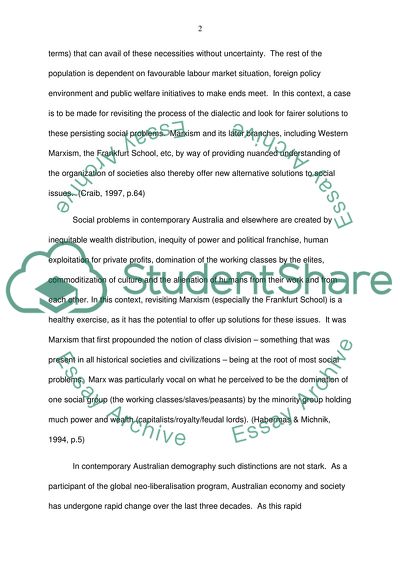Cite this document
(Domination Theory and Durkheim's Concept of Anomie Essay - 1, n.d.)
Domination Theory and Durkheim's Concept of Anomie Essay - 1. https://studentshare.org/sociology/1753119-social-thoery-and-policy-essay-topic-use-critical-theorists-domination-thoery-durkheims-concept-of-anomie-to-illustrate-how-they-can-be-used-to-enhance-our-understanding-of-social-security-policy-in-contemporary-australia
Domination Theory and Durkheim's Concept of Anomie Essay - 1. https://studentshare.org/sociology/1753119-social-thoery-and-policy-essay-topic-use-critical-theorists-domination-thoery-durkheims-concept-of-anomie-to-illustrate-how-they-can-be-used-to-enhance-our-understanding-of-social-security-policy-in-contemporary-australia
(Domination Theory and Durkheim'S Concept of Anomie Essay - 1)
Domination Theory and Durkheim'S Concept of Anomie Essay - 1. https://studentshare.org/sociology/1753119-social-thoery-and-policy-essay-topic-use-critical-theorists-domination-thoery-durkheims-concept-of-anomie-to-illustrate-how-they-can-be-used-to-enhance-our-understanding-of-social-security-policy-in-contemporary-australia.
Domination Theory and Durkheim'S Concept of Anomie Essay - 1. https://studentshare.org/sociology/1753119-social-thoery-and-policy-essay-topic-use-critical-theorists-domination-thoery-durkheims-concept-of-anomie-to-illustrate-how-they-can-be-used-to-enhance-our-understanding-of-social-security-policy-in-contemporary-australia.
“Domination Theory and Durkheim'S Concept of Anomie Essay - 1”. https://studentshare.org/sociology/1753119-social-thoery-and-policy-essay-topic-use-critical-theorists-domination-thoery-durkheims-concept-of-anomie-to-illustrate-how-they-can-be-used-to-enhance-our-understanding-of-social-security-policy-in-contemporary-australia.


